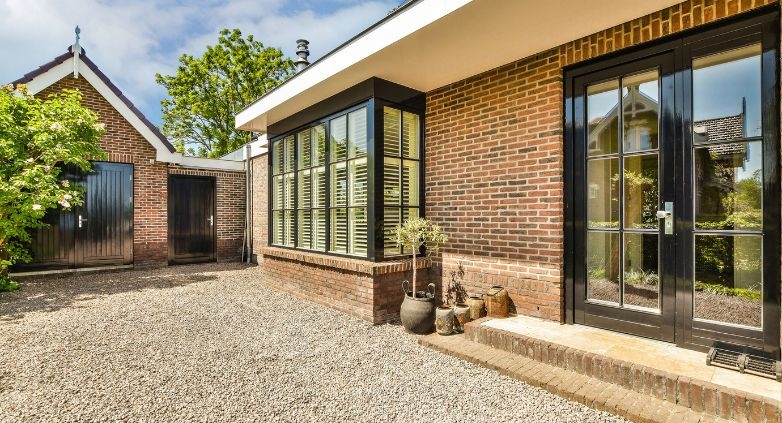Gravel Driveway – Pros & Cons – Gravel vs. Asphalt
A Gravel driveway stands as a popular choice in both residential and commercial settings, celebrated for its multitude of advantages for property owners. Its widespread use extends beyond the confines of construction sites, finding a place in real estate developments. In this discussion, we delve into the merits and drawbacks of the gravel driveway, exploring its role in the construction industry and its integration with concrete garage floors in residential areas.
Gravel driveways have earned favor among property owners for several reasons. One notable advantage lies in their affordability, making them a cost-effective option for those seeking a practical and economical driveway solution. Additionally, gravel driveways are known for their ease of maintenance, requiring minimal effort to keep them in good condition.
As we explore the nuances of gravel driveways, it becomes evident that their choice is often rooted in a delicate balance between cost-effectiveness and aesthetic considerations. Whether in the rustic charm of the countryside or seamlessly connecting to concrete garage spaces, gravel driveways continue to carve a niche in the realm of practical and versatile driveway solutions.
What is a gravel driveway?
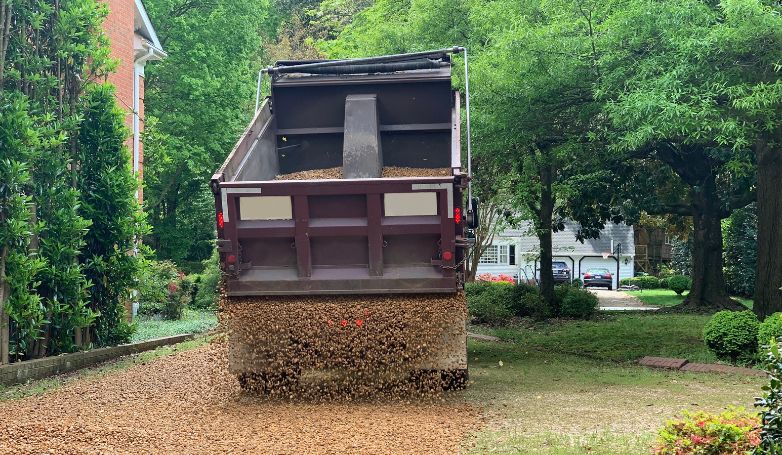
The term gravel refers to any loose stone or rock that is smaller than cobble but bigger than sand, with a diameter ranging from 1/10 inch to 2 1/2 inches. Gravel for driveways is mainly a processed product composed of rocks, clay, and sand. This mixture is well compacted to form a sturdy driveway surface.
Gravel is by far the most accessible material to work with when it comes to driveway materials. If you have the time and desire, a gravel driveway can be constructed as a do-it-yourself project. However, before you commit to laying the gravel yourself, you should think about a number of things, such as the right size, how to mark off the driveway area, and so on.
Gravel driveways, when correctly designed, can be less expensive and endure longer than other options for driveway construction. Ultimately, to guarantee that your driveway performs effectively and lasts as long as possible, there is a need to choose the proper gravel for your environment.
The Pros and Cons of a Gravel Driveway
There are many advantages of using gravel as a driveway construction and a few drawbacks associated with it. So, whether you are considering replacing your existing driveway or installing a new one with gravel, the following pros and cons will help you with your decision against that next project.
Pros
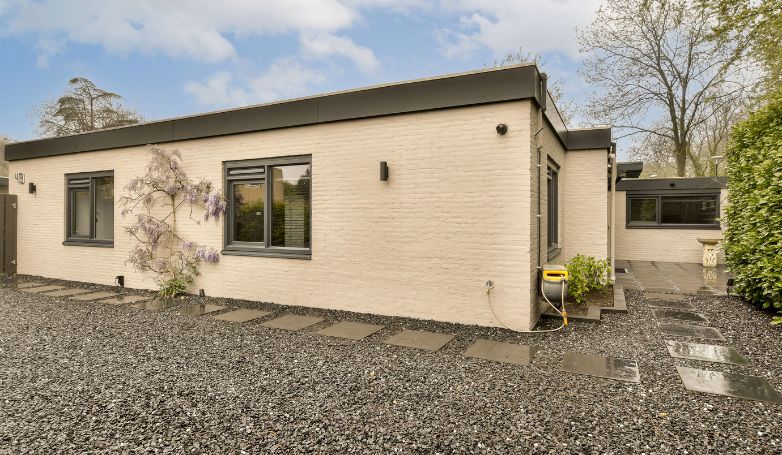
Exploring the positive aspects of gravel driveways sheds light on the benefits that accompany their rustic allure. From the quaint aesthetic appeal to the cost-effective installation and versatile maintenance options, these advantages make gravel driveways an appealing choice for homeowners seeking a visually pleasing, budget-friendly, and adaptable driveway solution.
Cost-friendly
This cost-effective material offers a budget-friendly solution, allowing you to acquire it without denting your finances. Its affordability makes it consistently accessible, ensuring that you can always find it on hand for your needs. Despite its economical price, it’s important to allocate a small budget for the annual maintenance of your driveway, ensuring its longevity and optimal performance over time. This ensures that your initial investment remains a wise and sustainable choice, offering both convenience and cost-effectiveness in the long run.
Easy Maintenance
Maintaining the surfaces of your driveway is a breeze, sparing you from unnecessary hassles. In the event of sinking due to environmental factors such as rainwater or snow, the simple process of filling it up is all that’s required. The inherent characteristics of gravel contribute to its ability to effortlessly accommodate the reflow of water from the ground, enhancing its resilience against the elements. This ease of maintenance adds to the overall convenience of choosing gravel for your driveway, ensuring that upkeep remains a straightforward and manageable task.
Diversity of design
Gravel stands out as an excellent choice for enhancing the sophisticated design of your residence’s exterior structure, seamlessly blending with various architectural styles to lend a timeless charm. Its versatile appeal caters to a broad spectrum of tastes, effortlessly complementing both classic and modern aesthetics with equal finesse. Beyond its aesthetic prowess, the tactile richness underfoot and natural hues add warmth and character, while its low-maintenance nature ensures a visually pleasing and sustainable outdoor space over time.
Easy installation
In a mere week, usher in the swift metamorphosis of your landscape by opting for gravel as your driveway construction material. Embrace not only the expeditious nature of the process but also the immediate gratification that comes with enjoying your newly built driveway without the need for prolonged anticipation. Gravel not only accelerates the transformation but also infuses your outdoor space with a timeless and versatile charm, ensuring a seamless fusion of functionality and aesthetic appeal.
Resistant to weather
Gravel driveways are often unaffected by extreme weather and do not require additional drainage to handle run-off and surface water during severe rainstorms. Besides, if you utilize the highly suggested driveway grids on your drive, you’ll be happy to hear that they’re also porous, allowing water to run down into the ground.
Water drainage
A gravel driveway, in addition to its aesthetic benefits, plays a pivotal role in efficient water drainage. By allowing water to permeate the surface and drain into the ground, it ensures that the driveway remains unaffected, effectively managing water runoff without compromising its structural integrity.
Cons
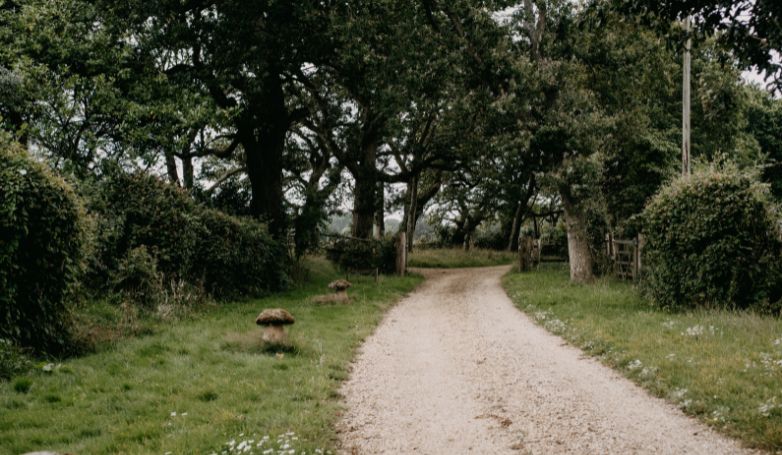
Delving into the drawbacks of gravel driveways, it’s essential to acknowledge the challenges that accompany their rustic allure. From the perpetual task of combating gravel migration, requiring frequent regrading, to the winter woes of snow removal and potential weed growth, these drawbacks underscore the ongoing maintenance demands associated with this driveway option.
Snow and ice removal
The difficulty associated with removing snow and ice is one of the biggest challenges of using gravel for driveway installation. It takes extra effort to remove snow and ice from a gravel driveway when it’s winter season. To make the surface less slippery, you may have to use salt and sand on the driveway surface.
Formation of ruts
Ruts can form on a heavily used gravel driveway, which is unsightly. To keep it looking nice, you’ll need to fill in the ruts on a routine basis. Any driveway constructed with gravel is more likely to develop ruts over time.
It tends to become dirty
don’t be surprised when you see dust and dirt in the air while driving over this type of driveway. This occurrence mainly takes place during the dry season, and it may make the exterior of your residence dirty. Besides, if not careful, the dust from the driveway can fill up the stuff in your rooms.
Types of Gravel for Driveway
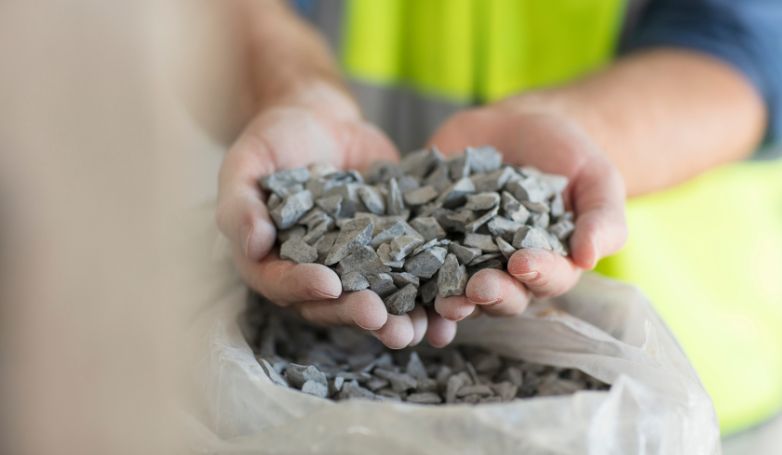
Choosing the right type of gravel for your driveway is essential for both functionality and aesthetic appeal. Here are three popular types of gravel commonly used for driveways.
Pea Gravel
Comprising small, smooth, and naturally rounded stones, pea gravel is a versatile choice for landscaping projects. Its diminutive size and smooth texture make it ideal for creating visually appealing surfaces in garden pathways, flowerbed borders, and drainage solutions.
Blackstar Rock
Characterized by its angular and dark composition, Blackstar Rock is a striking option for those seeking a bold and contemporary aesthetic. The jagged edges of the stones contribute to a unique and textured appearance, making it suitable for decorative landscaping or modern outdoor designs.
Quarry Process
Quarry Process, or QP, is a blend of crushed stone and stone dust. This combination results in a durable and compact material, making it an excellent choice for constructing driveways, walkways, or as a foundational base for various construction projects.
Crushed Stone
Crushed stone consists of mechanically crushed rocks, available in a range of sizes. This versatile material finds application in driveways, pathways, and as a foundational component in construction projects. Its irregular shape allows for effective interlocking, ensuring stability in various applications.
Marble Chips
Composed of smooth and polished marble fragments, marble chips provide an elegant and decorative touch to outdoor spaces. This material is often chosen for its aesthetic appeal in driveways and pathways, adding a touch of sophistication to landscaping projects.
Maintaining a Gravel Driveway
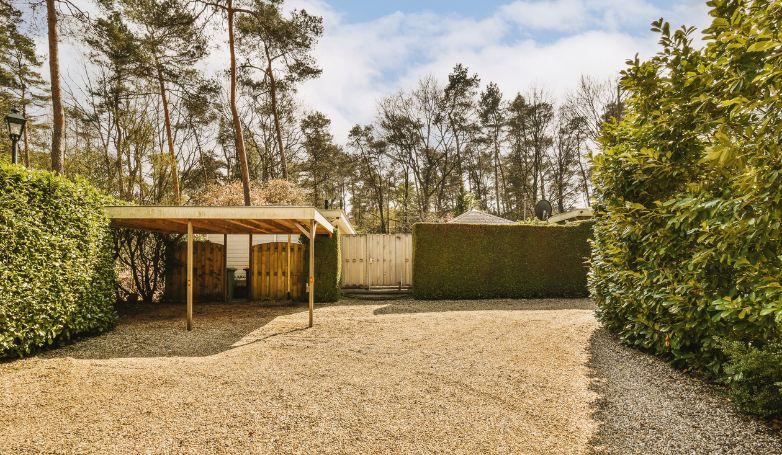
You will need monthly maintenance for gravel driveways more than concrete or asphalt driveways. For maximum utilization, always take care of the gravel driveway, as this will cut down avoidable costs for repairs and replacement.
Try to regrade your gravel driveway at least once annually. However, the number of times you regrade your driveway is dependent on the climate and condition and the number of vehicles plying the road every year.
Addressing Damage and Effective Repairs
Even when it is well maintained, grooves, dips, and potholes are prone to cause damage to driveways constructed with gravel. Besides, reckless activities like a rash way of driving cars will make the gravel driveway lose out quickly.
The good news is that even with damages caused by potholes and dips, it can be easily repaired with little effort. Many landlords can effortlessly fill the potholes with extra gravel they have left by using a shovel. And the earlier this is done, the better because the dips and potholes are controlled from getting worse. In a case where there are larger potholes, a bigger implement is used and not a shovel.
Tractor, grader, and bucket are the suitable tools used for regrading. The grader is used to level the surface, extend it, and neatly fit in the gravel.
Challenges in Winter and Recommended Solutions
The major challenge of using gravel driveways is the difficulty that comes with plow or snowblower. As earlier highlighted, the gravel is coarse and doesn’t have a smooth surface, making it really hard to remove dirt, unlike the concrete that can be scrapped without any displacement.
Furthermore, gravel is not winter-friendly, which means regardless of how careful the scraping is done, it is expected to displace during this season. However, a replacement is often recommended to be on the safer side.
How Long Will a Gravel Driveway Last?
The pleasing thing about gravel is that you can regrade and restore it on a regular basis. This means that if it is well maintained, gravel driveways can last for ten decades.
However, asphalt and concrete are difficult to correct or restore when they wear out. They require a considerable amount of money to repair when compared to driveways built with gravel.
In addition, gravel is not too open to damages from yeartide freeze-thaw cycles or frost heave, which can cause noticeable cracking and settling in solid driveway materials.
How Much Does a Gravel Driveway Cost?
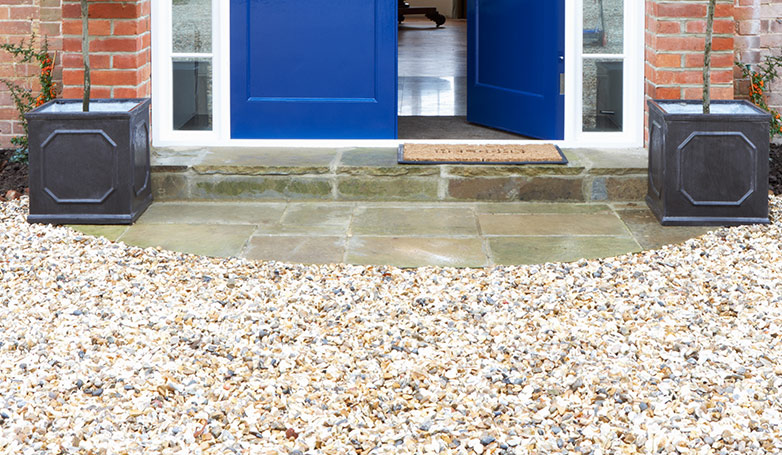
As said earlier, gravel is cost-friendly and can be affordable by any homeowner. It doesn’t have a fixed price, but it ranges from $1 square foot to more than $3 per square foot. The distance the gravel has to be trucked to the project site is a significant factor contributing to the price disparity. Another consideration is the driveway’s thickness; the more thick the driveway, the more the price.
However, no matter the amount, gravel driveways are the cheapest driveways you can ever get.
Who Is a Gravel Driveway Good For?
Gravel driveways are ideal for residences in rural locations, but they can also be used in urban settings. Besides, since this driveway type is adaptable and overly flexible, they are perfect for property prone to movement or having huge tree roots close to it.
In addition, gravel driveways are generally preferred by large property owners over asphalt or even concrete as they’re more cost-effective to install.
Nevertheless, this driveway type does not perform well for homes that necessitate constant scraping or snow plowing since there is a probability that the plow can scrape up the gravel as well. Before constructing this driveway type in the city, ensure your local department is consulted to inquire about the kind of rock to be used because not all gravel fits the particular land meant for the project.
How to make a gravel driveway
Below are a few of the steps you can follow a gravel driveway:
- Stake out the driveway’s path using landscape stakes with string or wine.
- You ought to clear the topsoil or any grass from the marked-off area to make way for the gravel.
- After you’ve cleared a route for the gravel driveway, you’ll need to figure out how much stone you’ll need.
- Plan gravel delivery and level the soil along the driveway’s path before the first gravel delivery truck arrives at your home.
- You should have the base layer of gravel spread out and compacted
- Proceed to add a middle layer of driveway gravel. In an ideal world, the gravel delivery truck would have this done for you, and whether that is feasible or not, the edge of the gravel driveway will need some TLC first.
- Lastly, add the surface layer of gravel.
Gravel vs. Asphalt Driveway
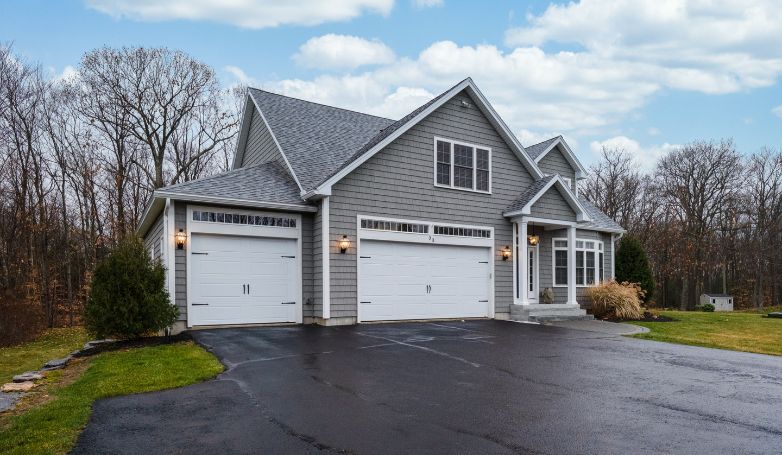
Both gravel and asphalt driveways have advantages and disadvantages. So, when deciding which driveway option to use, it’s critical to evaluate both.
So, the following are some things you need to know regarding gravel vs. asphalt driveway. The below points will help you make an informed decision about which option to consider for your next project.
Appearance
A gorgeous, jet-black asphalt driveway has a far more polished esthetic than a gravel driveway. Although some people prefer the rustic look of gravel driveways, the beauty of blacktop is hard to compare.
Cost of installation
Although gravel is less expensive than asphalt, asphalt is still a viable paving option. So, before opting for gravel due to its low cost, consult with your local paving specialist about asphalt and the project cost.
Durability
Both gravel and asphalt driveways can survive for decades if properly maintained. Your local climate determines the lifespan of your asphalt or gravel driveway, but you should expect 10 to 20 years for asphalt and much longer for gravel.
Snow/Ice suitability
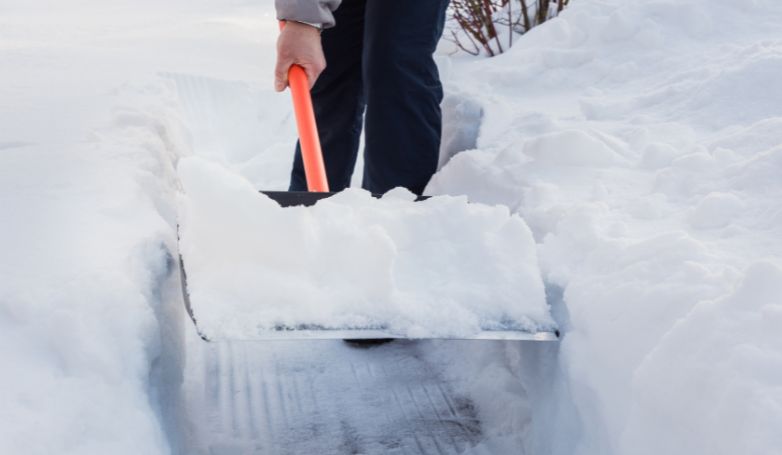
Blacktops, also known as asphalt surfaces, exhibit a remarkable ability to absorb and retain the sun’s radiant heat, rendering them an ideal selection for regions characterized by colder climates. This inherent property transforms asphalt driveways into efficient agents for combating winter weather challenges.
Property value
While gravel driveways may serve practical purposes, their contribution to enhancing the overall value of your property is limited. On the other hand, the aesthetic allure of asphalt goes beyond functionality, adding a touch of sophistication and visual appeal that can significantly elevate your property’s value.
Load-carrying capacity
Gravel is little more than crushed rock, and we all know how tough rock is. And so, it can withstand daily traffic as well as heavy farm equipment and heavy loads. Gravel is a popular choice when there is much weight in consideration, such as industrial equipment. On the other hand, while asphalt’s flexibility allows it to carry most big loads, such as your municipal garbage truck, heavy loads during periods of extreme cold or heat, it can render your asphalt driveway more vulnerable to damage.
Roughness on vehicles
Gravel driveway is harder to drive on than asphalt. The increased vehicle exertion on gravel vs. asphalt might wear your vehicle and tires out earlier than expected based on how often you use your driveway.
Displacement
Gravel driveways can be displaced by the weight of vehicles and equipment; as a result, raking, shoveling, and grading will be required to replace stone that has been moved off its route. If adequately laid, asphalt, on the other hand, will stay compacted for a long time.
Washout
Gravel isn’t as well-fixed as asphalt; therefore, it will eventually wash away. So, if you don’t want to ruin your driveway after a few strong rainstorms, gravel paving isn’t a suitable option in flood-prone areas.
Conclusion
As a property owner planning to install a new driveway for your residence or commercial area, gravel is an excellent choice to consider. However, it depends on what you intend to get out of the driveway project.
For example, gravel is your best bet if you need a more viable, affordable, durable, sturdy material. On the other hand, you want a more esthetically pleasing surface that will contribute to your home value, then think asphalt.
In a nutshell, it would be best to consult with your driveway contractor to discuss your need to get informed advice to guide you in your decision.

